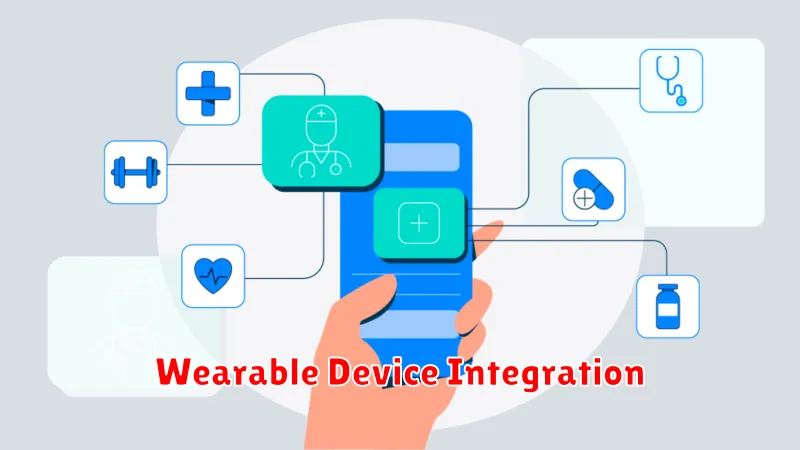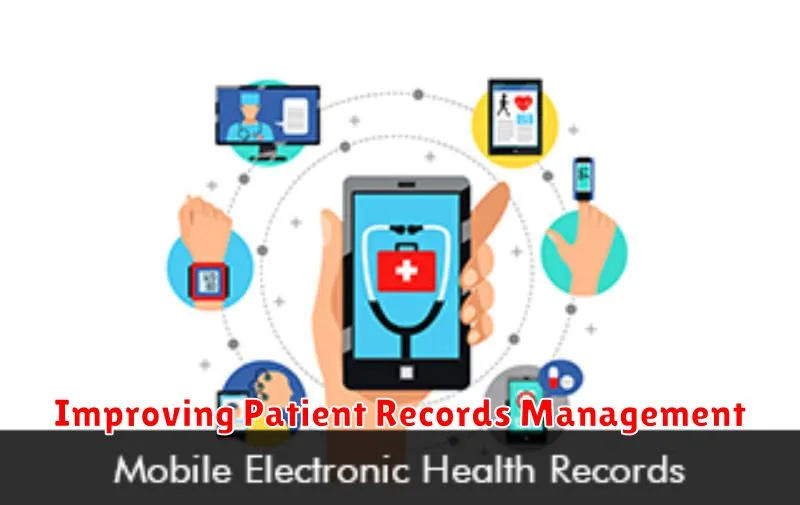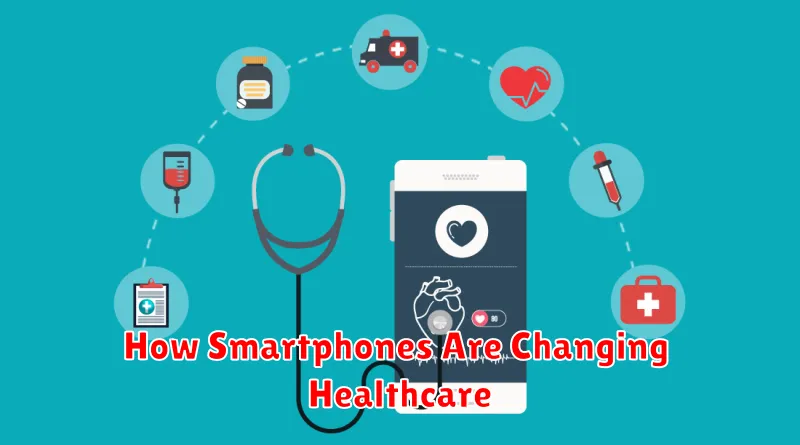Smartphones are rapidly transforming the healthcare landscape, offering unprecedented opportunities for both patients and medical professionals. The proliferation of mobile health (mHealth) applications and wearable devices has empowered individuals to take control of their own health, while simultaneously providing clinicians with new tools for diagnosis, treatment, and patient engagement. This evolution in healthcare delivery promises to increase accessibility, improve outcomes, and reduce costs, marking a significant shift towards a more patient-centric and connected healthcare system. From remote patient monitoring to virtual consultations, the impact of smartphones on healthcare is undeniable and continues to expand at a remarkable pace.
This article explores the multifaceted ways in which smartphones are revolutionizing healthcare. We will examine the key trends driving this transformation, including the rise of telemedicine, the growing use of health and fitness apps, and the integration of artificial intelligence (AI) in mobile health solutions. Furthermore, we will delve into the benefits and challenges associated with this technological shift, addressing issues such as data privacy, security, and the potential for exacerbating health disparities. By understanding the current landscape and future potential of smartphone technology in healthcare, we can better harness its power to improve global health outcomes and create a more equitable and accessible healthcare system for all.
Telemedicine and Virtual Consultations
Telemedicine has emerged as a transformative force in healthcare, largely facilitated by the ubiquity of smartphones. These devices allow patients and healthcare providers to connect remotely, offering increased convenience and access to care.
Virtual consultations via video conferencing enable patients to receive medical advice, diagnoses, and even treatment for a range of conditions without the need for a physical visit. This is particularly beneficial for individuals in rural areas with limited access to specialists or those with mobility challenges.
Furthermore, smartphones support remote patient monitoring, allowing healthcare professionals to track vital signs and other health data in real-time. This continuous monitoring allows for proactive interventions and personalized care.
Health Monitoring Apps
Health monitoring apps represent a significant advancement in personal healthcare management, facilitated by the ubiquity of smartphones. These applications empower individuals to track various health metrics, fostering a more proactive approach to well-being.
These apps encompass a wide range of functionalities, from basic step counting and calorie tracking to more sophisticated monitoring of vital signs such as heart rate and sleep patterns. Some apps even allow users to log medications, symptoms, and mood changes, providing valuable data for personal understanding and potentially for sharing with healthcare professionals.
The convenience and accessibility of these apps contribute to increased patient engagement and awareness of their own health. By providing readily available data, these tools can facilitate more informed discussions between patients and their doctors, leading to more personalized and effective care.
Wearable Device Integration

The integration of wearable devices is significantly impacting healthcare through their connection with smartphones. These devices, including smartwatches and fitness trackers, collect valuable health data such as heart rate, sleep patterns, and activity levels. This data, when transmitted to smartphones, provides individuals with insights into their health and enables them to make more informed decisions about their wellbeing.
Furthermore, this integration empowers healthcare professionals. By accessing patient-generated health data from wearables via smartphone applications, physicians can gain a more holistic view of a patient’s health. This continuous stream of data can aid in early diagnosis, personalized treatment plans, and remote patient monitoring, leading to more proactive and preventative care.
Medication Reminders and Management
Smartphones offer a powerful tool for managing medications. Medication reminder apps send timely notifications, helping patients adhere to their prescribed regimens. This is particularly useful for individuals managing multiple medications or complex schedules.
Beyond simple reminders, some apps offer advanced features. These include tracking medication intake, logging side effects, and providing information about potential drug interactions. Such features can be instrumental in improving medication adherence and patient safety.
Some apps even integrate with pharmacy systems, allowing for prescription refills and streamlined communication with healthcare providers. This integration further simplifies medication management, making it more convenient and efficient.
Mental Health Support
Smartphones are playing an increasingly significant role in mental health support. These devices offer readily accessible platforms for delivering therapeutic interventions.
Numerous apps provide resources such as guided meditations, mood tracking tools, and cognitive behavioral therapy (CBT) exercises. This allows individuals to manage their mental well-being with greater flexibility and privacy.
Furthermore, smartphones facilitate communication between patients and therapists through secure messaging and video conferencing, reducing barriers to care, particularly for those in remote areas or with limited mobility.
Emergency Response and Alerts
Smartphones play a crucial role in enhancing emergency response and alerts. Rapid access to emergency services through dialing 911 remains a core function, now streamlined with location tracking for faster dispatch.
Specialized apps extend this functionality. Medical ID apps allow first responders to access critical medical information, such as allergies and pre-existing conditions, even when the phone is locked. This immediate access can be life-saving in time-critical situations.
Furthermore, smartphones facilitate broader public health alerts. Government agencies and healthcare organizations can disseminate real-time alerts about disease outbreaks, natural disasters, or other emergencies directly to individuals, enabling faster responses and preventative measures.
AI and Diagnostic Tools
Artificial intelligence is rapidly transforming diagnostic tools available on smartphones. AI-powered apps can now analyze images and provide preliminary assessments for various conditions, from skin cancer to eye diseases. This empowers individuals to take proactive steps in managing their health.
Furthermore, AI algorithms can analyze data collected by wearable sensors, such as heart rate and sleep patterns, to detect anomalies and potential health risks. This predictive capability allows for early interventions and potentially prevents serious health complications.
Improving Patient Records Management

Smartphones are revolutionizing patient records management, offering enhanced accessibility and efficiency.
Traditional paper-based systems are often cumbersome and prone to errors. Smartphones enable the transition to digital record-keeping, allowing healthcare professionals to quickly and accurately access patient information.
This improved access facilitates better care coordination, reduces administrative overhead, and minimizes the risk of medical errors due to lost or incomplete records.
Future Trends in Smartphone Healthcare
The integration of smartphones into healthcare is rapidly evolving. Several key trends are poised to further revolutionize this space.
Remote Patient Monitoring will become increasingly sophisticated. Smartphones, coupled with wearable sensors, will provide continuous data streams, allowing for proactive intervention and personalized care.
Artificial Intelligence (AI) and machine learning algorithms will play a crucial role in analyzing patient data collected via smartphones. This will enable earlier disease detection, personalized treatment plans, and more effective preventative care.
Expansion of telehealth services will continue, driven by increased connectivity and improved smartphone technology. Virtual consultations, remote diagnosis, and mental health support will become more accessible and commonplace.
Ethics and Privacy Concerns
The increasing use of smartphones in healthcare raises significant ethical and privacy concerns. Data security is paramount. Patient information, often highly sensitive, must be protected from unauthorized access and breaches. Robust security measures are essential to maintain patient trust and comply with regulations like HIPAA.
Data ownership and access are also key ethical considerations. Who owns the data collected by health apps? Who has the right to access it? Clear guidelines and informed consent protocols are necessary to navigate these complexities.
Another concern arises from the potential for bias in algorithms used by health apps. If these algorithms are trained on biased data, they can perpetuate and exacerbate health disparities. Careful development and validation of these algorithms are crucial to ensuring equitable access to care.

